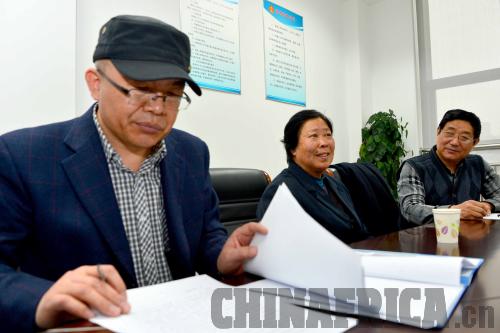| 
Li Shuting (left), defending lawyer in the Nie Shubin case, reads court files in court
How hard is it for lawyers in China to meet the detained suspects they are defending?
Gao Zicheng, President of Beijing Lawyers Association (BLA), went to find out for himself and the experience left him disillusioned and frustrated.
At the end of May, Gao paid a visit to a detention house in Beijing's Haidian District to test the process. Despite having all the documents and materials required to visit the detainee, Gao was refused permission on the excuse that staff were following "regulations from higher-ups."
The renowned defense lawyer, who has been refused the right to meet detained suspects on many occasions, said he visited the detention house in Haidian to highlight the difficulties lawyers face in the course of their work. To drive his point home, Gao presented a report on his experience to the Beijing Municipal People's Congress and Beijing Municipal People's Procuratorate, putting forward a dozen suggestions for improvements.
In July, the Haidian Detention House, taking cognizance of Gao's recommendations, amended their regulations so that all lawyers could meet detainees in the detention house.
The good news is that lawyers nationwide will soon find it easier to do their work. On September 16, the Supreme People's Court, the Supreme People's Procuratorate, Ministry of Public Security, Ministry of State Security and Ministry of Justice jointly issued the Provisions on Ensuring the Protection of Practice Rights of Lawyers According to Law to guarantee lawyers' rights to practice.
According to the provisions, detention houses must allow defense counsels to meet suspects or defendants, or must explain why the meeting cannot be arranged at a specific time and then ensure that it is arranged within 48 hours. In addition, procuratorates and courts must allow defense counsels to read case files and ensure that case files can be accessed within three working days after receiving an application. There will be no time and frequency limit for defense counsels to read case files.
A big step forward
Though lawyers in China have the right to meet the detainees they are defending, read the latter's files, investigate and collect evidence according to law, there are complaints that it is difficult for them to do these tasks. Once suspects are detained, defense lawyers have to go through complicated procedures to meet them. In some cases, lawyers cannot see detainees or read their files on the pretext that these are "special cases."
Take Nie Shubin's case, for example. Nie was executed for rape and murder in 1995. But in 2013, he was posthumously judged by the court to be innocent. Defense lawyers were not allowed to read all the files until March 2015.
"Lawyers' right to practice should be respected and recognized," said Liao Xiangqi, a lawyer with the Hainan Falixin Law Firm. "This is really great progress in building up China's legal system. It is also an important step to implement the rule of law put forward by the 18th National Congress of the Communist Party of China in 2012."
According to Liao, though in the literal sense the provisions protect only lawyers' rights, actually, they ensure the legal rights of all parties involved, including defendants.
"There is no democratic and legal progress in China without the participation of lawyers," Liao said. "After years of development, lawyers have become an absolutely necessary force in the process of promoting the rule of law in China. That's why their practice rights should be ensured, instead of being ignored like [in] many cases."
Ministry of Justice statistics show China had over 270,000 lawyers in more than 20,000 law firms in 2014.
Relief mechanisms
The amended regulation also improves the relief and responsibility mechanisms in lawyers' right to practice. When their rights are violated, lawyers can lodge complaints with higher organs or procuratorate bodies. These departments have discipline inspection and supervision agencies that have responsibility of handling these complaints.
"The provisions have really done a great job in ensuring lawyers' practice rights," said Gu Yongzhong, a professor at China University of Political Science and Law. Gu said when lawyers complained in the past, they seldom received a response as the departments they complained about were the same ones handling the complaints.
"But now, discipline inspection and supervision agencies are in charge of handling complaints, which can help rectify the illegal practice," Gu said.
niyanshuo@chinafrica.cn |